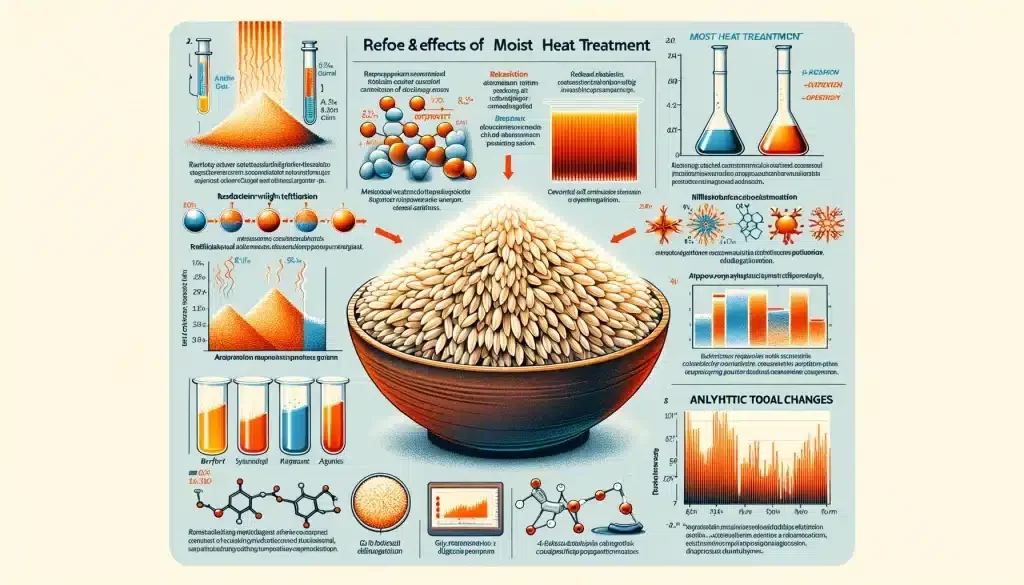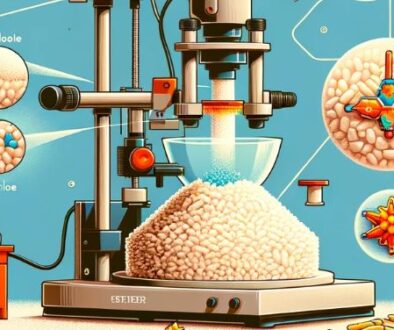Effect Of Moist Heat Treatment On Multi-Layered Structure And Digestion Characteristics Of Rice Starch
Exploring the effect of moist heat treatment on rice starch digestibility through advanced analytical methods, offering insights for food processing technology.
In order to clarify the relationship between the multi-level structure and digestion performance of rice starch before and after moist heat treatment, this study used in vitro simulation methods to determine the digestion performance of rice starch before and after moist heat treatment, and through small-angle X-ray scattering (SAXS) and X-ray diffraction (XRD) and modern analytical techniques such as gel permeation chromatography-multi-angle laser light scattering (GPC-MALS) to examine the changes in different hierarchical structures of rice starch before and after moist heat treatment. Research shows that moist heat treatment can cause the degree of ordering of the semi-crystalline lamellae of rice starch to decrease, reducing its degree of crystallization and molecular weight; at the same time, accompanied by the destruction of the lamellar, crystallographic and molecular chain structures within the starch granules, the starch-lipid complex The formation of substances and the reduction of high molecular weight fragments with Mw >2¡Á107 g/mol and the increase in the proportion of low molecular weight fragments with Mw<5¡Á106 g/mol (0% to 21.3%) are beneficial to the slow digestion and resistance of rice starch. The improvement of digestion performance, and when the Mw<5¡Á106 g/mol ratio increases to 32.1%, may be due to more low molecular weight fragments, which hinders the improvement of slow digestion and anti-digestion performance. The research results provide theoretical support and basic data for moist heat treatment processing technology to regulate the digestion performance of starch and starchy foods.
Introduction to Rice Starch Digestibility Study
Rice, a staple food for a significant portion of the global population, plays a crucial role in the human diet. Given the rising interest in nutrition and health, the digestibility of rice starch has become a focal point of scientific inquiry. This study endeavors to illuminate the intricate relationship between the multi-level structure of rice starch and its digestion performance, particularly focusing on changes induced by moist heat treatment.
Methodological Approach to Assessing Digestion Performance
Utilizing advanced in vitro simulation methods, the research meticulously assesses the digestion performance of rice starch, both in its untreated state and following moist heat treatment. A suite of modern analytical techniques, including small-angle X-ray scattering (SAXS), X-ray diffraction (XRD), and gel permeation chromatography-multi-angle laser light scattering (GPC-MALS), was employed to probe the alterations in the hierarchical structures of rice starch consequent to moist heat treatment.
Key Findings on Structural Changes from Moist Heat Treatment
The findings reveal that moist heat treatment engenders a diminution in the ordering of the semi-crystalline lamellae within rice starch. This leads to a reduction in both the degree of crystallization and the molecular weight of the starch, alongside the degradation of the lamellar, crystallographic, and molecular chain structures within the starch granules. A notable outcome of these structural alterations is the formation of starch-lipid complexes and a shift in the molecular weight distribution. Specifically, there is a marked decrease in the proportion of high molecular weight fragments (>2×10^7 g/mol) and a concurrent increase in low molecular weight fragments (<5×10^6 g/mol) from 0% to 21.3%. Such changes are conducive to enhancing the slow digestion and resistance of rice starch to enzymatic breakdown, thereby improving its digestion performance.
Impact on Molecular Weight Distribution and Digestion Performance
Interestingly, the study also uncovers that when the proportion of low molecular weight fragments increases to 32.1%, the beneficial effects on slow digestion and resistance to digestion may be mitigated. This phenomenon is attributed to the overabundance of low molecular weight fragments, which potentially obstructs the enhancement of starch’s resistive properties to digestion.
Theoretical Contributions and Practical Implications for Food Processing
The research presented herein provides invaluable theoretical support and fundamental data for the application of moist heat treatment processing technology. By elucidating the effects of this treatment on the structural and digestion properties of rice starch, the study contributes to the development of starch and starchy foods with tailored digestion characteristics. Such advancements hold the promise of improving nutritional profiles and catering to the diverse dietary needs and health objectives of populations worldwide.
Conclusion: Advancing Nutritional Science and Food Technology
In conclusion, this comprehensive investigation not only advances our understanding of the relationship between starch structure and digestibility but also paves the way for innovative food processing techniques that can modulate the digestion performance of rice and similar starchy foods, aligning with the growing demand for foods that support health and well-being.
For futher details of this article and research, feel free to contact our team for assistance.
Original research was done by Wang Hongwei
About ETprotein:
ETprotein, a reputable plant protein vegan protein Chinese factory manufacturer and supplier, is renowned for producing, stocking, exporting, and delivering the highest quality organic bulk vegan protein and plant proteins. They include Organic rice protein, clear rice protein, pea protein, clear pea protein, oat protein, watermelon seed protein, pumpkin seed protein, sunflower seed protein, mung bean protein, peanut protein, various of plant peptides etc. Their offerings, characterized by a neutral taste, non-GMO, allergen-free attributes, cater to a diverse range of industries. They serve nutraceutical, pharmaceutical, cosmeceutical, veterinary, as well as food and beverage finished product distributors, traders, and manufacturers across Europe, USA, Canada, Australia, Thailand, Japan, Korea, Brazil, and Chile, among others.
ETprotein specialization includes exporting and delivering tailor-made protein powder and finished nutritional supplements. Their extensive product range covers sectors like Food and Beverage, Sports Nutrition, Weight Management, Dietary Supplements, Health and Wellness Products, and Infant Formula, ensuring comprehensive solutions to meet all your protein needs.
As a trusted company by leading global food and beverage brands and Fortune 500 companies, ETprotein reinforces China’s reputation in the global arena. For more information or to get a free sample of their protein products, please contact them and email sales(at)ETprotein.com today.












